#coding toys
Explore tagged Tumblr posts
Text
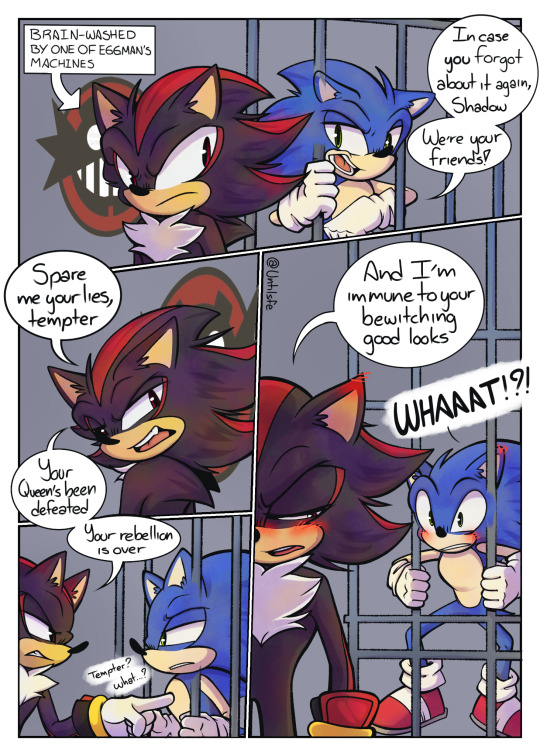
When aggravation turns into a confession. Damn, that sure escalated quickly!!
#Reinterpretation of Toy Story 3#Shadow is Buzz lightyear coded and you can't change my mind#Sonic in romantic panic is one of my favorite tropes#my art#sonic fanart#sonic the hedgehog#shadow the hedgehog#sonic fandom#sonic x shadow#Sonadow#comic fanart
9K notes
·
View notes
Video
youtube
CODING ROBOTS FOR KIDS 8+ | EDUCATIONAL TOYS TO LEARN CODING | GREAT HOLIDAY GIFT
#youtube#coding kids#coding for kids#coding toys#learn coding with toys#coding toys for 8+#coding toys for kids
0 notes
Text
Crocodile toy in 12th panel belongs to @ferahntics

















Previous - Next
#IT'S DONE#DB Found siblings#Bobby bearhug#Doey#Doey the doughman#ADDING TAGS#This comic nearly did my laptop in guys it was getting so slow by the time I was watermarking each panel#I was starting to get worried it'd freeze on me-#but it DIDN'T#What a trooper!#Doey is big brother coded to the small toys I'll die on this hill#heck some toys probably view him like a parent cuz some of them might not have had one before#Bobby just wants her big brother to be safe#who protects the protectors and that kind of mentality#Also going to tag this nightmare comic#I'll try and go back and edit the tags in the first part to so it's easier for people to find#nightmare comic#nightmaer comic part 2#Poppy playtime#Poppy playtime OC#Palettes art#My art
1K notes
·
View notes
Text






hawks's ugly jacket ↳ screenshot "redraw"! i figured out how to make the jacket Worse :) but also better! which is: just delete it
#personally i love his fuckass jacket it's so bird hawk coded ofc keigo was drawn to it :')#the bit is you can make his jacket anything which: obv means i've been walking around my apt holding him up to all kinds of leopard print#he's turned into a toy for me bc of this. beloved#i plan to post alt pattern jacket photos later tho it's a little daunting on what patterns to choose lolllll#okay papercraft fun fact: his pupils are sequins :)#keigo takami#mha hawks#bnha hawks#bnha#mha#first bnha art wtf tags do i use lol#papercraft#kathcraft
529 notes
·
View notes
Text

boyfriendcore (cr)
#sylvanian families#calico critters#boyfriendcore#kawaiicore#cutecore#cute bunny#bunny#boyfriend coded#vintage toys#cute toys#toycore#bunnycore#credit on the cr link#source: pinterest
485 notes
·
View notes
Text
Damasio, The Trolley Problem and Batman: Under the Hood
Okay so @bestangelofall asked me to elaborate on what I meant by "Damasio's theories on emotions in moral decision-making add another level of depth to the analysis of UTH as a moral dilemma" and I thought this deserved its own post so let's talk about this.
So, idk where everyone is at here (philosophy was mandatory in highschool in my country but apparently that's not the case everywhere so i genuinely have no clue what's common knowledge here, i don't want to like state the obvious but also we should recap some stuff. Also if I'm mentioning a philosopher's or scientist's name without detailing, that means it's just a passing thought/recommendation if you want to read more on the topic.)
First thing first is I've seen said, about jason and the no killing rule, that "killing is always bad that's not up for debate". And I would like to say, that's factually untrue. Like, no matter which side of the debate you are on, there is very much a debate. Historically a big thing even. So if that's not something you're open to hear about, if you're convinced your position is the only correct one and even considering other options is wrong and/or a waste of time... I recommend stopping here, because this only going to make you upset, and you have better stuff to do with your life than getting upset over an essay. In any case please stay civil and remember that this post is not about me debating ethics with the whole bat-tumblr, it's me describing a debate other people have been voicing for a long time, explaining the position Damasio's neuropsychology and philosophy holds in this debate, and analyzing the ethics discussed in Batman: Under the Red Hood in that light. So while I might talk about my personal position in here (because I have an opinion in this debate), this isn't a philosophy post; this is a literature analysis that just so happens to exist within the context of a neuropsychological position on a philosophical debate. Do not try to convince me that my philosophy of ethics is wrong, because that's not the point, that's not what the post is about, I find it very frustrating and you will be blocked. I don't have the energy to defend my personal opinions against everybody who disagrees with me.
Now, let's start with Bruce. Bruce, in Under The Hood and wrt the no kill rule (not necessarily all of his ethics, i'm talking specifically about the no kill rule), is defending a deontological position. Deontology is a philosophy of ethics coined by christian🧷 18th century German philosopher Immanuel Kant. The philosophy of ethics asks this question: what does it mean to do a good action? And deontology answers "it means to do things following a set of principles". Basically Kant describes what are "absolute imperatives" which are rules that hold inherent moral values: some things are fundamentally wrong and others are bad. Batman's no-kill rule is thus a categorical imperative: "Though Shall not Kill"🧷, it is always wrong to kill. (Note that I am not saying Bruce is kantian just because he has a deontology: Kant explained the concept of deontological ethics, and then went up to theorize his own very specific and odd brand of deontology, which banned anything that if generalized would cause the collapse of society as well as, inexplicably, masturbation. Bruce is not Kantian, he's just, regarding the no kill rule, deontological. Batman is still allowed to wank, don't worry.)
In this debate, deontological ethics are often pit up against teleological ethics, the most famous group of which being consequentialism, the most famous of consequentialisms being utilitarism. As the name indicates, consequentialist theories posit that the intended consequences of your actions determine if those actions were good or not. Utilitarism claims that to do good, your actions should aim to maximise happiness for the most people possible. So Jason, when he says "one should kill the Joker to prevent the thousands of victims he is going to harm if one does not kill him", is holding a utilitarian position.
The debate between deontology and utilitarism has held many forms, some fantastical and some with more realistic approaches to real life like "say you're hiding from soldiers and you're holding a baby that's gonna start crying, alerting the soldiers and getting everyone in your hideout massacred. Do you muffle the baby, knowing it will suffocate and kill it?" or "say there's a plague going on and people are dying and the hospital does not have enough ventilators, do you take the one off of the comatose patient with under 0.01% chance of ever waking up to give it to another patient? What about 1%?", etc, etc. The most famous derivative of this dilemma, of course, being the infamous trolley problem.
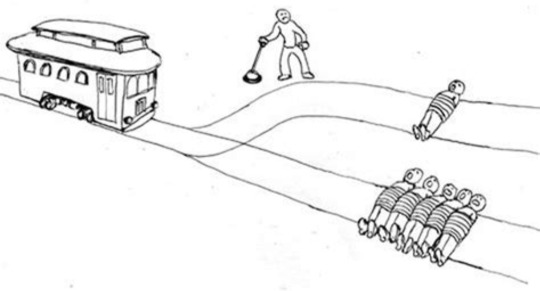
This is what is meant when we say "the UTH confrontation is a trolley problem." The final confrontation at the warehouse is a variation, a derivative of the utilitarian dilemma that goes as follows: "if someone was trying to kill someone in front of you, and that murder would prevent the murder of thousands, should you try to stop that murder or let it happen?"
Now, here's a question: why are there so many derivatives of the trolley problem? Why do philosophers spend time pondering different versions of the same question instead of solving it?
My opinion (and the one of much, much smarter people whose name i forgot oops) is that both systems fail at giving us a satisfying, clean-cut reply. Now, most people have a clean-cut answer to the trolley problem as presented here: me personally, I lean more towards utilitarianism, and I found it logical to pull the lever. But altering the exact situation makes me change my answer, and there is very often a point where people, no matter their deontological or utilitarian velleities, change their answer. And that's interesting to examine.
So let's talk about deontology. Now my first gripe with deontology it's that it posits a set of rules as absolute and I find that often quite arbitrary. 🧷 Like, it feels a little like mathematical axioms, you know? We build a whole worldview on the assumption that these rules are inherently correct and the best configuration because it feels like it makes sense, and accidentally close our mind to the world of non-euclidian ethics. In practice, here are some situations in which a deontologist might change their mind: self-defense killing, for example, is often cited as "an exception to the rule", making that rule de facto non-universal; and disqualifying it as an absolute imperative. Strangely enough, people will often try to solve the trolley problem by deciding to kill themselves by jumping on the tracks 🧷 which is actually a utilitarian solution: whether you're pulling the lever or you're jumping on the tracks, you are choosing to kill one person to stop the people from being run over. Why does it matter if it's you or someone else you're killing? You're still killing someone. Another situation where people may change their answer would be, like "what if you needed to save your children but to do so you had to kill the ceo of united healthcare?" Note that these are only examples for killing, but the biggest issue is that deontology preaches actions are always either good or wrong, and the issue with that lack of nuance is best illustrated with the kantian problem regarding the morality of lying: let's say it's the holocaust and a family of jews is hiding in your house. Let's say a nazi knocks on your door and asks if there are people hiding in your house. You know if you tell the truth, the jews in your house will be deported. In that situation, is it morally correct to lie? Now, Kant lived before the Holocaust, but in his time there was a similar version of this problem that had been verbalised (this formulation is the best-known derivative of this problem btw, I didn't invent it) and Kant's answer, I kid you not, was still "no it is not morally acceptable to lie in that situation".
And of course, there are variations of that problem that play with the definition of killing- what defines the act of killing and can the other circumstances (like if there's a person you need to save) alter that definition? => Conclusion: there is a lot more nuance to moral actions than what a purely deontological frame claims, and pushing deontology to its limits leads to situations that would feel absurd to us.
Now let's take utilitarianism to its own limits. Say you live in a world where healthcare has never been better. Now say this system is so because there is a whole small caste of people who have been cloned and genetically optimized and conditioned since birth so that their organs could be harvested at any given moment to heal someone. Let's say this system is so performant it has optimised this world's humanity's general well-being and health, leading to an undeniable, unparalleled positive net-worth for humanity. Here's the question: is this world a utopia or a dystopia? Aka, is raising a caste of people as organ cattle morally acceptable in that situation? (Note: Because people's limits on utilitarianism vary greatly from one person to another, I chose the most extreme example I could remember, but of course there are far more nuanced ones. Again, I wasn't the one to come up with this example. If you're looking for examples of this in fiction, i think the limits of utilitarianism are explored pretty interestingly in the videogame The Last of Us).
=> Conclusion: there is a lot more nuance to moral actions than what a purely utilitarian frame claims, and pushing utilitarism to its limits leads to situations that would feel absurd to us.
This leads us back to Under the Hood. Now because UTH includes a scathing criticism of Batman's no kill rule deontology, but Jason is also presented as a villain in this one, my analysis of the whole comic is based on the confrontation between both of these philosophies and their failures, culminating in a trolley dilemma type situation. So this is why it makes sense to have Bruce get mad at Jason for killing Captain Nazi in self-defense: rejecting self-defense, even against nazis, is the logical absurd conclusion of deontology. Winick is simply taking Bruce's no-kill rule to the limit.
And that's part of what gets me about Jason killing goons (aside from the willis todd thing that should definitely have been addressed in such a plot point.) It's that it feels to me like Jason's philosophy is presented as wrong because it leads to unacceptable decisions, but killing goons is not the logical absurd conclusion of utilitarianism. It's a. a side-effect of Jason's plot against Bruce and/or, depending on how charitable you are to either Jason's intelligence or his morals, b. a miscalculation. Assuming Jason's actions in killing goons are a reflection of his moral code (which is already a great assumption, because people not following their own morals is actually the norm, we are not paragons of virtue), then this means that 1) he has calculated that those goons dying would induce an increase in general global human happiness and thus 2) based on this premise, he follows the utilitarian framework and thus believes it's moral to kill the goons. It's the association of (1) and (2) that leads to an absurd and blatantly immoral consequence, but since the premise (1) is a clear miscalculation, the fact that (1) & (2) leads to something wrong does not count as a valid criticism of (2): to put it differently, since the premise is wrong, the conclusion being wrong does not give me any additional info on the value of the reasoning. This is a little like saying "Since 1+ 3= 5 and 2+2=4, then 1+3+2+2 = 9". The conclusion is wrong, but because the first part (1+3=5) is false, the conclusion being wrong does not mean that the second part (2+2 =4) is wrong. So that's what frustrates me so much when people bring up Jason killing goons as a gotcha for criticizing his utilitarian philosophy, because it is not!! It looks like it from afar but it isn't, which is so frustrating because, as stated previously, there are indeed real limits to utilitarianism that could have been explored instead to truly level the moral playing field between Jason and Bruce.
Now that all of this is said and done, let's talk about what in utilitarianism and deontology makes them flawed and, you guessed it, talk some about neuropsychology (and how that leads to what's imo maybe the most interesting thing about the philosophy in Under the Hood.)
In Green Arrow (2001), in an arc also written by Judd Winick, Mia Dearden meets a tortured man who begs her to kill him to save Star City (which is being massacred), and she kills him, then starts to cry and begs Ollie for confirmation that this was the right thing to do. Does this make Mia a utilitarian? If so, then why did she doubt and cry? Is she instead a deontologist, who made a mistake?
In any case, the reason why Mia's decision was so difficult for her to make and live with, and the reason why all of these trolley-adjacent dilemmas are so hard, is pretty clear. Mia's actions were driven by fear and empathy. It's harder to tolerate sacrificing our own child to avoid killing, it's harder to decide to sacrifice a child than an adult, a world where people are raised to harvest their organs feels horrible because these are real humans we can have empathy towards and putting ourselves in their shoes is terrifying... So we have two "perfectly logical" rational systems toppled by our emotions. But which is wrong: should we try to shut down our empathy and emotions so as to always be righteous? Are they a parasite stopping us from being true moral beings?
Classically, we (at least in my culture in western civilization) have historically separated emotions from cognition (cognition being the domain of thought, reasoning, intelligence, etc.) Descartes, for example, was a philosopher who highlighted a dualist separation of emotion and rationality. For a long time this was the position in psychology, with even nowadays some people who think normal psychologists are for helping with emotions and neuropsychologists are for helping with cognition.(I will fight these people with a stick.) Anyway, that position was the predominant one in psychology up until Damasio (not the famous writer, the neuropsychologist) wrote a book named Descartes' Error. (A fundamental of neuropsychology and a classic that conjugates neurology, psychology and philosophy: what more could you ask for?)
Damasio's book's title speaks for itself: you cannot separate emotion from intelligence. For centuries we have considered emotions to be parasitic towards reasoning, (which even had implications on social themes and constructs through the centuries 📌): you're being emotional, you're letting emotions cloud your judgement, you're emotionally compromised, you're not thinking clearly... (Which is pretty pertinent to consider from the angle of A Death in the Family, because this is literally the reproach Bruce makes to Jason). Damasio based the book on the Damasio couple's (him and his wife) study of Phineas Gage, a very, very famous case of frontal syndrome (damage to the part of the brain just behind the forehead associated with executive functions issues, behavioural issues and emotional regulation). The couple's research on Gage lead Damasio, in his book, to this conclusion: emotions are as much of a part of reasoning and moral decision-making as "cold cognition" (non emotional functioning). Think of it differently: emotional intelligence is a skill. Emotions are tools. On an evolutionary level, it is good that we as people have this skill to try and figure out what others might think and do. That's useful. Of course, that doesn't mean that struggling with empathy makes you immoral, but we people who struggle with empathy have stories of moments where that issue has made us hurt someone's feelings on accident, and it made us sad, because we didn't want to hurt their feelings. On an evolutionary level (and this is where social Darwinism fundamentally fails) humanity has been able to evolve in group and in a transgenerational group (passing knowledge from our ancestors long after their death, belonging to a community spread over a time longer than our lifetime) thanks to social cognition (see Tomasello's position on the evolution of language for more detail on that), and emotions, and "emotional intelligence" is a fundamental part of how that great system works across the ages.
And that's what makes Batman: Under the Hood brilliant on that regard. If I have to make a hypothesis on the state of Winick's knowledge on that stuff, I would say I'm pretty sure he knew about the utilitarism vs deontology issue; much harder to say about the Damasio part, but whether he's well-read in neuropsychology classics or just followed a similar line of reasoning, this is a phenomenally fun framework to consider UTH under.
Because UTH, and Jason's character for the matter, refuse to disregard emotions. Bruce says "we mustn't let ourselves get clouded by our emotions" and Jason, says "maybe you should." I don't necessarily think he has an ethical philosophy framework for that, I still do believe he's a utilitarian, but he's very emotion-driven and struggling to understand a mindframe that doesn't give the same space to emotions in decision-making. And as such, Jason says "it should matter. If the emotion was there, if you loved me so much, then it should matter in your decision of whether or not to let the Joker die, that it wasn't just a random person that he killed, but that he killed your son."
And Bruce is very much doubling down on this mindset of "I must be stronger than my feelings". He is an emotionally repressed character. He says "You don't understand. I don't think you've ever understood", and it's true, Jason can't seem to understand Bruce's position, there's something very "if that person doesn't show love in my perspective and understanding of what love is then they do not love me" about his character that I really appreciate. But Bruce certainly doesn't understand either, because while Jason is constantly asking Bruce for an explanation, for a "why do you not see things the way I do" that could never satisfy him, Bruce doesn't necessarily try to see things the way Jason does. And that's logical, since Jason is a 16 years old having a mental breakdown, and Bruce is a grown man carrying on the mission he has devoted himself to for years, the foundation he has built his life over. He can't allow himself to doubt, and why would he? He's the adult, he's the hero, he is, honestly, a pretty stubborn and set-in-his-ways character. So, instead of rising to the demand of emotional decision-making, Bruce doubles down on trying to ignore his feelings. And Jason, and the story doesn't let him. Bludheaven explodes. This induces extremely intense feelings in Bruce (his son just got exploded), which Jason didn't allow him to deal with, to handle with action or do anything about; Jason says no you stay right there, with me, with those emotions you're living right now, and you're making a decision. And there's the fact Bruce had a mini-heart attack just before thinking Jason was dead again. And there's the fact he mourned Jason for so long, and Stephanie just died, and Tim, Cass and Oracle all left, and the Joker is right there, and Jason puts a gun in his hands (like the gun that killed his parents)... All of that makes it impossible for Bruce to disregard his emotions. The same way Jason, who was spilling utilitarian rhetoric the whole time, is suddenly not talking about the Joker's mass murder victims but about he himself. The same way Jason acts against his own morals in Lost Days by sparing the Joker so they can have this confrontation later. That's part of why it's so important to me that Jason is crying in that confrontation.
Bruce's action at the end of the story can be understood two ways:
-he decides to maim/kill Jason to stop the insupportable influx of emotions, and him turning around is his refusal to look at his decision (looking away as a symbol of shame): Bruce has lost, in so that he cannot escape the dilemma, he succumbs to his emotions and acts against his morals.
-the batarang slicing Jason's throat is an accident: he is trying to find a way out of the dilemma, a solution that lets him save his principles, but his emotions cloud his judgement (maybe his hand trembles? Maybe his vision is blurry?). In any case, he kills his son, and it being an accident doesn't absolve him: his emotions hold more weight than his decision and he ends up acting against his morals anyway.
It's a very old story: a deontologist and a utilitarian try to solve the trolley problem, and everyone still loses. And who's laughing? The nihilist, of course. To him, nothing has sense, and so nothing matters. He's wrong though, always has been. That's the lesson I'm taking from Damasio's work. That's the prism through which I'm comparing empathy to ethics in Levinas' work and agape in Compté-Sponsville's intro to philosophy through.
It should matter. It's so essential that it matters. Love, emotions, empathy: those are fundamental in moral evaluation and decision making. They are a feature, not a bug. And the tragedy is when we try to force ourselves to make them not matter.
Anyway so that was my analysis of why Damasio's position on ethics is so fun to take in account when analysing UTH, hope you found this fun!
#dc#jason todd#dc comics#red hood#under the red hood#anti batman#anti bruce wayne#(< for filtering)#jason todd meta#neuropsychology meta#now with the philosophy extension!!#once again having very intense thoughts about Under The Hood#me talking about the “killing goons” part: this comic is so infuriating#me talking about the final confrontation: this is the greatest comic ever 😭😭#winick stop toying with my emotions challenge#anyway I put a couple of pins on some of the ideas in there don't worry about it#also i was told that color coding helped with clarity so hopefully that's still the case!
234 notes
·
View notes
Text
thinking about Muggle au regulus that ran away when he was over 18, no money, no idea how to make or save money, no cooking skills, no cleaning skills, freeloading on Barty and Evans couch and getting a job at a McDonald's drive through
imagine Sirius is buying maccas and the person handing over his food is his prissy spoilt brother that he hasn't seen in 5yrs
#“heres your happy meal have a lovely day and dont forget to scan the qr code on the toys package to go in the draw”#“regulus?? did the black family fortune run out???”#“...sirius... well im taking your happy meal enjoy starvation”#then proceeds to get yelled at by the shift manager for holding up the line#customer service regulus gives me nightmares#regulus isnt sure freedom is worth working 8hr shifts at a mcdonalds drive through#he misses having endless money and his family butler kreature#marauders#regulus black#dead gay wizards from the 70s#sirius black#marauders era#black brothers
218 notes
·
View notes
Text




"Code Name: Galactica" toys from Mattel Dimension 78.
The toys had this disclaimer:
NOTE: At press time, the official title for Universal Studios' TV space spectacular is still highly confidential. Until the show's official name is released to the public, ABC, Universal and Mattel have agreed to use the code name: Gallactica (sp).
194 notes
·
View notes
Text
The Way of Kings just crushed my girlfriend's box of sex toys under its sheer weight
777 notes
·
View notes
Text
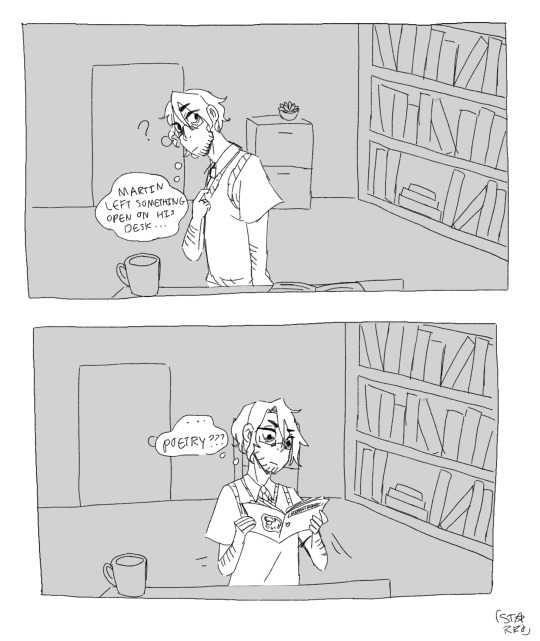
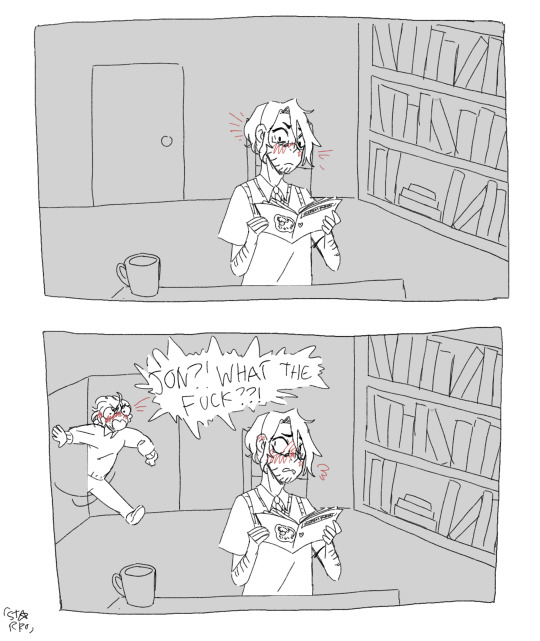
@jonmartinweek day 8: martin’s poetry
nosey little shit. also that tiny succulent in the background is my pride and joy and i’m annoyed at myself that i only showed it in one panel
#artrodent#tma#the magnus archives#tma fanart#jonathan sims#martin blackwood#jonmartinweek 2024#jonmartin#jmart#this is season 1 coded but i guess the whole spying on people thing is more season 2#jon is just a scrunkly little bitch#when i say scrunkly here i am also referring to the noise some toys make where it like crackles and crunches#that’s what he sounds like when you squish him
678 notes
·
View notes
Text
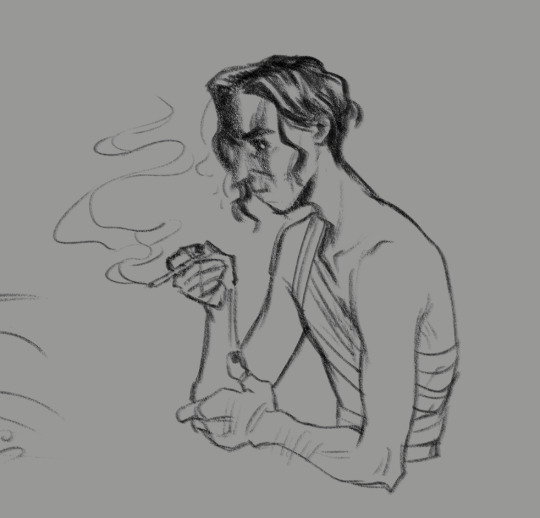
what if he lived and also grew out his hair again
#im unwell#deeply unwell#silco arcane#arcane#doodles#digital art#arcane singlehandedly forcing me to get back into drawing huh#i haven't felt this unwell about anyone in a very long time#i want to shake him like a dog shaking a chew toy#does that make me vander-coded
136 notes
·
View notes
Note
lola x the miku one
her name is SUNNY!!!! 😡😡 but i approve i think it’s funny
lola absolutely despise sunny, sunny is mildly annoyed by lola, but is a big fan of how she brings in profits
“i love you, you always know how to rake in the cash 😌”
“Man shut the FUCK up”
97 notes
·
View notes
Text
bloodletting
summary: a budding god needs a place to test their new powers, and childe was always a little too eager to lose a fight... a match made in heaven!
word count: 1.7k
-> warnings : minor AQ spoilers ? just like, general gi plot.. fairly graphic depiction of blood + other injuries (might be classed as body horror???). generally obsessive tendencies (childe <--> you). i cannot stress this enough, reader is 110% a sadist.
-> gn reader (you/yours)
taglist: @samarill || @thenyxsky || @valeriele3 || @shizunxie || @boba-is-a-soup || @yuus3n || @esthelily || @turningfrogsgay || @cupandtea24 || @genshin-impacts-me || @chaoticfivesworld || @raaawwwr || @ryuryuryuyurboat || @undrxtxd || @rainswept || @wanderersqt || @rozz-eokkk
< masterlist >

power was not something that came easy. it was fought over, stolen, defended with teeth and claw, tides of blood shed just so one could have power over another. social, physical, financial; no matter the leverage it provided, power was hard won. to give someone power was to admit defeat, a certain death that tartaglia had learned and taught more than his fair share of times. nobody undeserving of power ever held onto it for long; it was an acknowledgement that you were better, that you deserved it, that you’d won. power was a fickle resource that childe would kill to keep, only ever laying down his blade for a precious few.
the tsaritsa, of course. his fellow harbingers, skilled both on and off-field, who themselves could rival the archons. his family, for whom he’d happily give the world.
and naturally, who would be more worthy to hold power than you?
you, not just a god but the, the highest authority across all of teyvat. you bore a hundred names and a thousand monikers, your worship the one thing the world could agree on. granted, nobody could quite agree on how, but that was fine. childe did not need external powers to tell him what to do. he knew, in his deepest heart, that he had gotten it right.
he knew—and, on occasion, flaunted—that he was your favorite. of all the vessels you had chosen, you returned to him time and time again, wishing on his stars until his vision gleamed. his bow shone with power, even his weakest weapon more than enough to push his strength to new heights. part of him wondered what he could do if you’d granted him swords, or a claymore… but that was speculation for another time. didn’t it say something that you had still chosen him at his weakest?
the thought always made him smile. thick in the heat of puppeteered battle, before the sun to after dark, your presence was a constant in his life. at every altar, with every offering, when his hands stung from the rash of leather and his blade was covered in rust, your name a prayer behind blood-soaked teeth. he could not remember a time when his pocket was not weighted with a charm.
his devotion was no secret. he wore your bow with pride, entirely phasing out his other weapons. it didn’t matter that he was technically more controlled with them, for you had chosen this path for him. your word was his guide, a polar star through bitter nights.
he did not doubt when your presence ebbed or flowed. who was he to dictate when or where you spent your attention? no, his faith did not waver. it had no reason to. he waited patiently, going about his regular duties, lingering in snezhnaya for no other reason that he just felt like he had to.
who was he to question to buzzing in the back of his head? who was he to decline when he felt an instinct to leave, to go for a trip far past the city gates? who was he to think himself better than the guiding light that had never led him astray?
for you, he was whatever you needed. and so he went, armed with a thick coat and snowboots, hands shoved deep in the pockets to hide the slight shake. down the main road, an arbitrary turn into an alley and down an abandoned path, into a part of the city he’d never traveled. but a golden thread had tied itself around his heart, pulling without hesitation. he easily hopped over the fence gate, not bothering with hauling it open through the snow. the path beyond was covered in a thick layer of powder, his foot crunching through a foot of it before hitting solid ground. still, he continued.
snezhnayan winters were not warm. they bit and dug into every gap in your clothes, stealing away the precious warmth within. and yet, with his half-done coat and incomplete guard, he was not cold. or, rather, he couldn’t feel it. his hands were pink with frost, stiff at the knuckles, but he couldn’t feel the resistance. his body was not important, not now.
the snow began to thin. it fell from his knees to his shins to his ankles to his toes, until he was face to face with a thick wall of bramble, impossibly overgrown. he was beginning to overheat in his jacket. twin blades made quick work of the wall, and the sight behind it easily dispelled any breath left in his lungs.
the air that washed out of the bubble was thick and heavy, like a humid spring instead of snezhnayan woods. his breath came in short gasps, a shameful wheeze that he hoped was missed beneath the howling snow. he didn’t want you to see him as weak, as someone so easily tired by a short trip to a falling star; he didn’t want you to think of him as anything other than his best.
but you didn’t push him away. you helped him up—his head was buzzing with delusion, he could hardly see, when had he fallen to his knees?—and brushed the snow off his hair, not pushing him away when he leaned into your touch. he couldn’t think, couldn’t breathe, could barely collect himself enough to recognize that he needed to get you inside, away from the wilds.
that was power. to so effortlessly take over every thought in his head, to hold his mind in your hands and pull it into your liking, that was the power he adored you for. gods were figureheads of power, a physical incarnation of their dominion. a god of the entire world would only naturally have power to manipulate that world to their liking. how blessed was he, that he could be the first you made yours.
he was with you when you first stepped into zapolyarny palace, looking around at the chandeliers and fine tile. he opened the door for you to her majesty’s throne room, sucking in a sharp breath as you brushed by. he was by your side when the tsaritsa swore you her fealty, delicately placing the gnoses in your hands.
and oh, how he’d fallen to the floor right then and there, dizzy from the wash of power that rolled off you in waves, an ocean that he willingly dove into. the floor was cool beneath his forehead, his hair sticking to his skin as sweat quickly began to bead. he didn’t bother pushing himself up on his hands, teeth sinking deep into his lip again to control his panting breath. copper bloomed over his tongue, filling his mouth and clogging what remained of his senses.
dimly, he was aware that he was being pathetic, that this would surely change your mind about him. he heard your voice, faint through the fog of his mind, your wisdom lost to his own inadequacy. and yet, despite his weakness, every part of him was tuned into you. he knew it was your hand whispering across his shoulders, he knew it was your influence that stole the breath from his lungs. he knew it was you, because it was always you. you were all he could think of, and now you were finally able to leverage your full power over his self.
he’d woken up in a hospital bed. saline dripped into his arm and the lights pierced his eyes, his head full of snow and iced over. and yet, the moment he was cleared for release, he found himself desperate to be back to your side, racing through the tiled halls of the palace and following the urgent burn in his chest. you would have been right to turn him away, to deem him too weak to stay by your side, but you didn’t. you smiled when he lost his breath and laughed when he wavered, brushing off his concern. you invited him with you—his lungs burned with the need for oxygen��as you twirled the gnoses between your fingers, as if they were toys or paperweights rather than objects of divine power.
divine to him. child’s play to you. a courtyard of snow was cleared in an instant, ripples of pyro melting permafrost while keeping the flora beneath intact, a lazy show of power that pulled little more than a slight hum from you in response.
he wasn’t so much a fool as to think he could teach you everything, or even something, about being divine. and yet he clung to your side like a sailor in a storm, watching as you grew familiar with the elements. he watched, stubborn and weak, as you stopped hesitating.
flowers bloomed as you walked by, crumbling to ash with the slightest look. electro jumped from your skin to his, a painful spark that drew his mind from his head, finally seeing your amused eyes instead of just mindlessly staring. you could—should—have just left him behind, but you didn’t. you instead asked for his help, taking his hand in yours and leading him to a quieter hallway of the palace. you didn’t comment on his thundering pulse despite the fact that you could certainly feel it, tracing a finger along the crease of his palm.
“i wonder…”
a claw of geo cut across his skin, a sharp sting that quickly welled with blood. he barely felt it, watching with detached awe as it filled up his hand, sliding over the edge and dripping to the floor. you didn’t show any emotion, just… watching. his heart beat in his hands, a pool collecting on the floor, and still, you just watched. your other hand moved over the surface, barely an inch away, the blood collecting in a bubble beneath it. with a hum, your fist tightened, pain lighting up his arm. a strained grunt slipped between his teeth, hand flinching closed, brushing against the ball of his blood you had pulled from his veins. his hand was stained red, shaking in your grasp, minutes stretched into hours.
all at once, it dropped, forced back into his body as forcefully as it was removed. with a snap, the skin stitched itself shut, and you were again dragging him along like a child did their favorite toy.
you did that a lot. pull him aside and experiment with whatever new reaction you had discovered that month, week, day, hour, watching his reactions with unabashed delight. and he let you. every time, without fail, he eagerly followed, knowing full well he’d end up rigid with lightning or with ice crystals studding his throat. it was worth it, though. you always fixed him up, squeezing his hand with a whispered ‘good job’ that never failed to make him dizzy.
it didn’t matter what you did to him. it never did. even when his mind was hazy with pain and he couldn’t quite stand on his own, he never regretted it. unconsciousness licked at the edges of his vision, burning black stains that lingered even after you stopped, but he never once hesitated.
if you asked him to jump, he’d ask how high. if you felt like holding him underwater, he’d cherish every bruise. to be kept as a toy was still to be kept.
#THIS WAS MEANT TO BE A REPLY TO AN ASK. UH. SORRY AVATAR ANON ...#genshin#genshin impact#genshin sagau#sagau#self aware genshin#genshin x reader#gender neutral reader#sagau childe#yandere childe#childe x reader#x reader#yandere tartaglia#sagau tartaglia#< do people even use the 'tartaglia' tags? oh well#yandere sagau#blood tw#tw blood#< for good measure#ah yes my favorite genre. 'you're both unwell and need to be quarantined for the good of society'#hes so. rat coded im in love with him#sorry for fatui posting. it Will happen again#sorry for yan posting. it /Will/ happen again#like seriously the next few ideas ive got are all about unwell men#i dont know if id count this as obsessive but its certainly A form of lovesickness#but i feel when people read 'yandere' they think of something else than i do#and for That perception then 'obsessive' fits better#i will be flagging this with the yan warning on my masterlist#childe ajax tartaglia my favorite chew toy <333#hes so fun to beat up i wanna make him cry about it. i mean what who said that
314 notes
·
View notes
Text
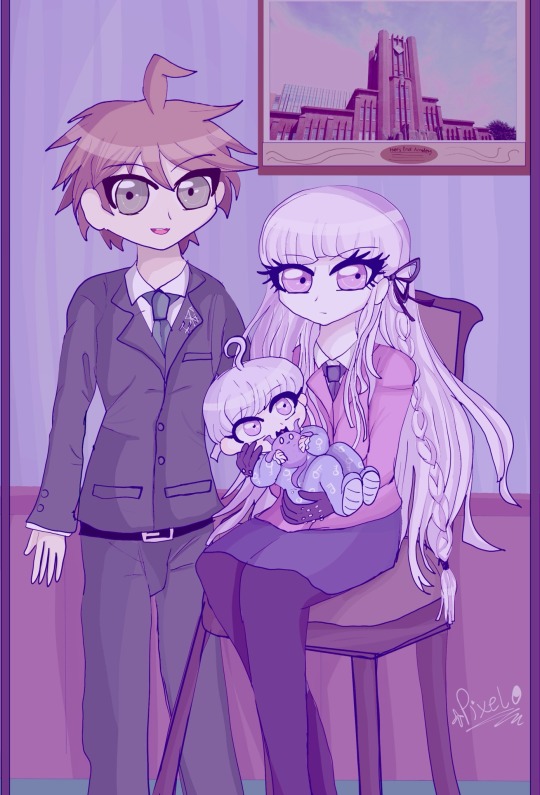
Family Portrait
(I’ve wanted to draw this for a while… xD)
'Something' gave me the push I needed to finally do it LOL
More below (warning: long post)
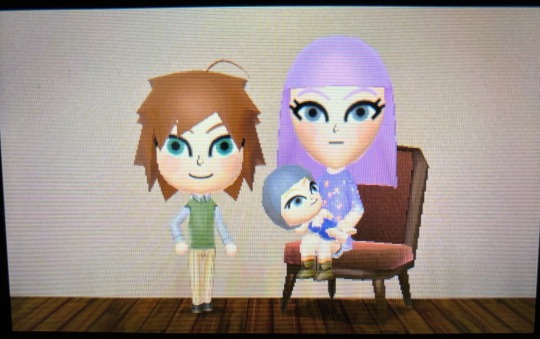
Okay show of hands. Who rebooted their old Tomodachi Life game (or Miitopia) after Nintendo announced it for the switch? Cause I know I sure did lol
You all saw me enjoying myself with Miitopia a bit but then I found my Tomodachi Life game, and…it was a file with an Island full of every single Danganronpa Character. Its even called Dangan Island. (I did this back in 2017 lol)
It was kinda fun to go back to it, but then I decided I wanted to add Yuma to the game too. So I did…after soft resetting for hours to get Makoto or Kyoko to want to have a baby… xD
Look at him :D
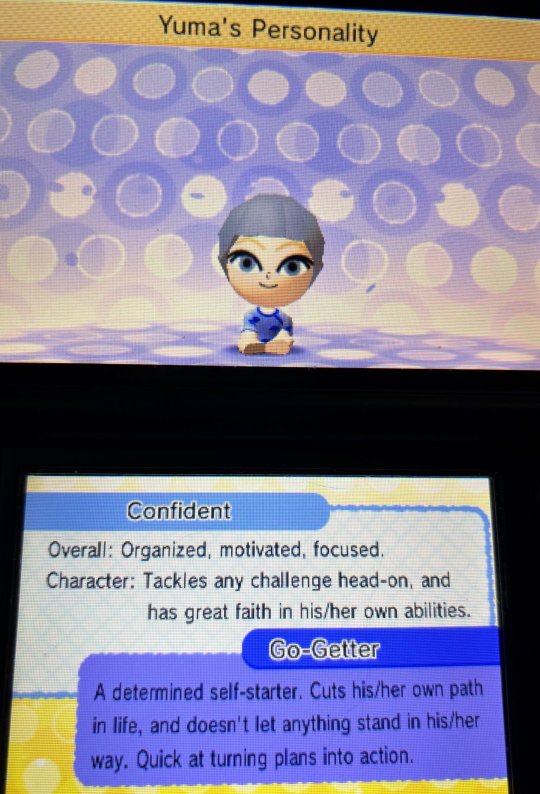
And it was fun watching the little guy grow up. I practically went picture happy on him xD So I thought I’d share his little days of growth~ (his hair is gray while he's little because purple wasn't an option in the og mii creator so he has Kyoko's base hair color ;w; Hopefully the sequel will have more options for hair)
This is the closest I’ll get to seeing him have a childhood w these two as his mom and dad. Lol thanks tomodachi life)
The babies in this game are so cute and silly ;w;
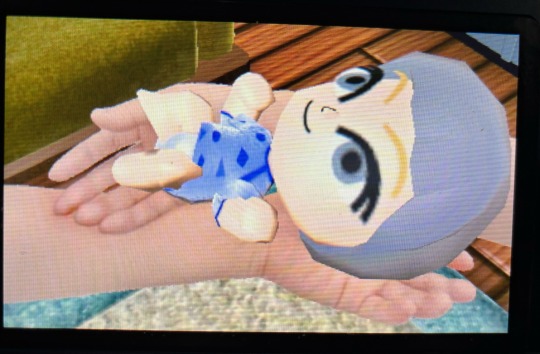
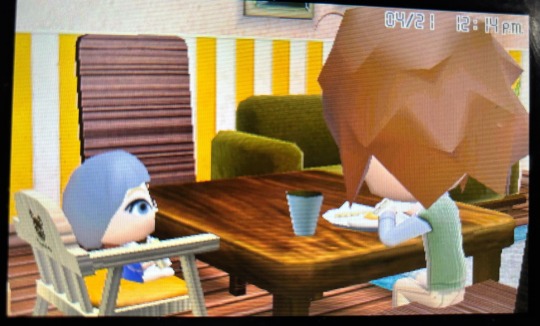
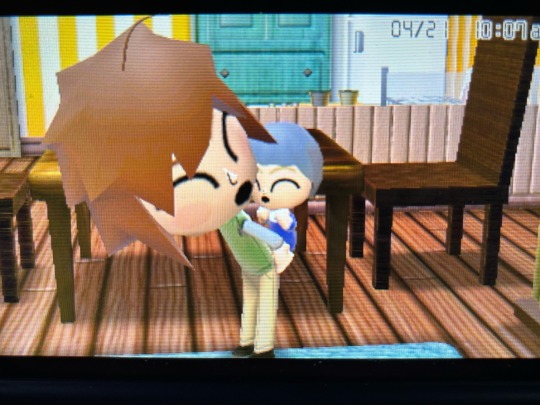
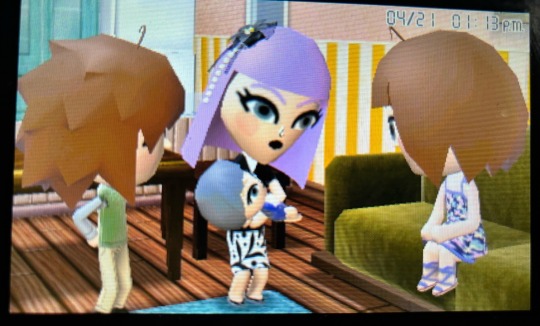
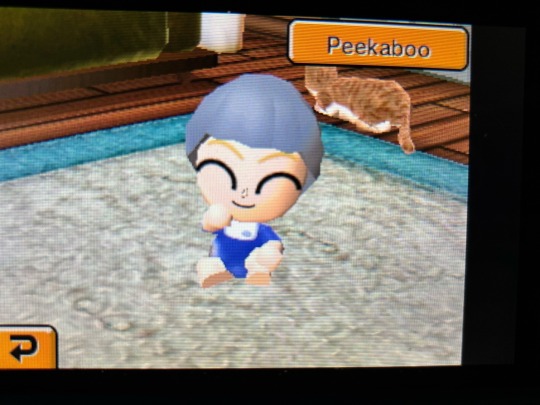
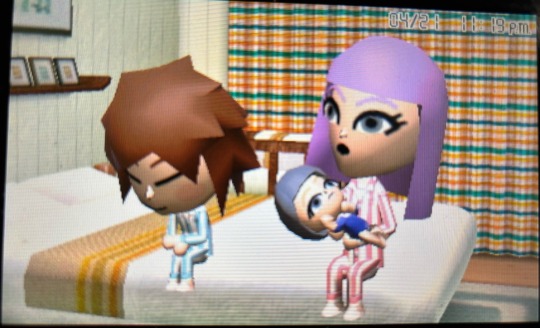
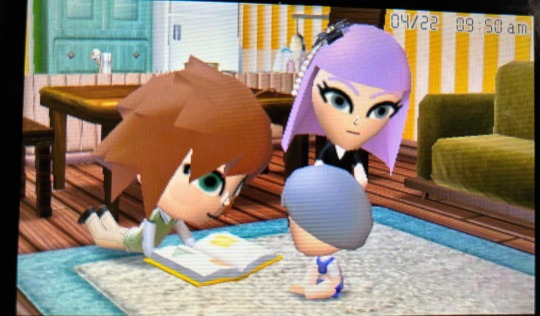
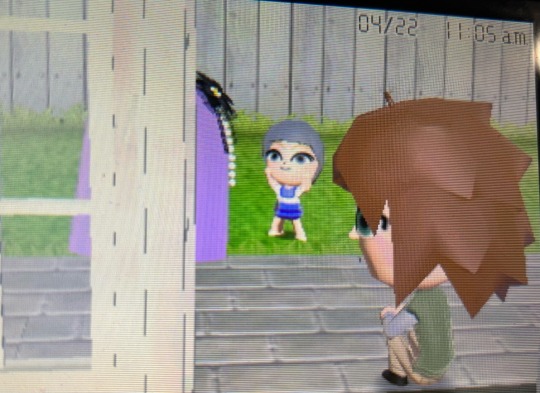
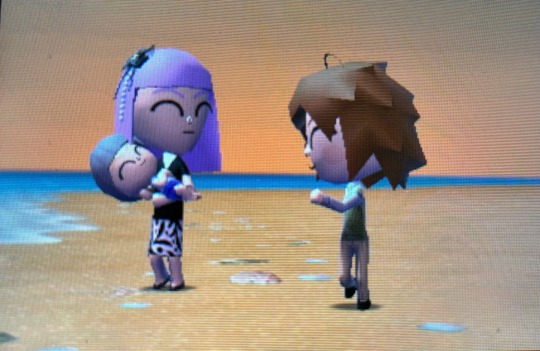
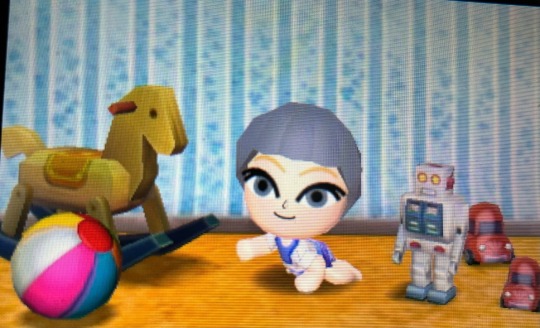
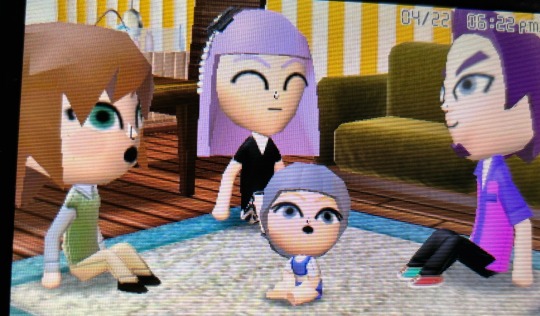

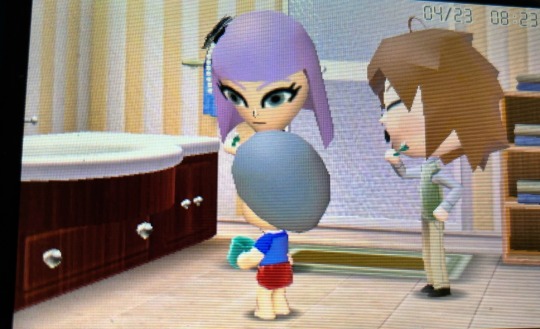
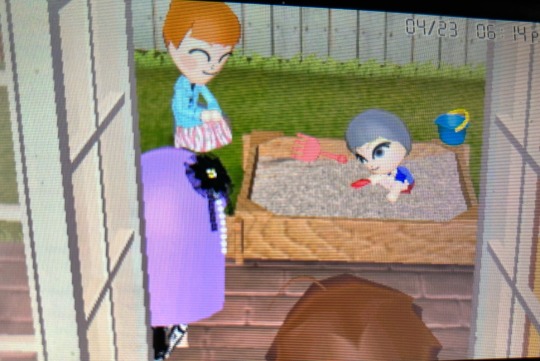
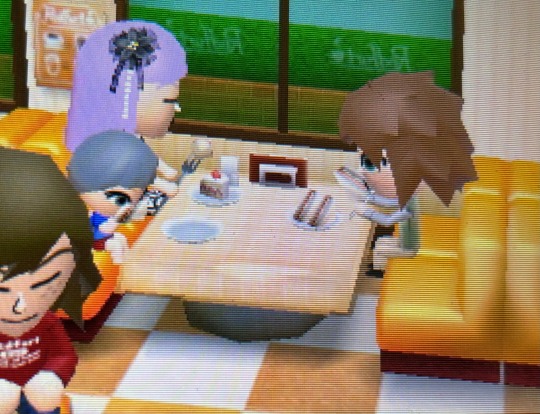
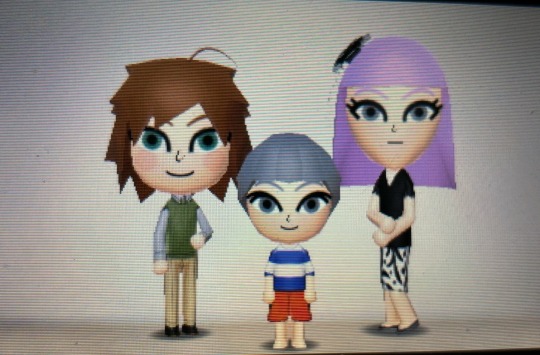
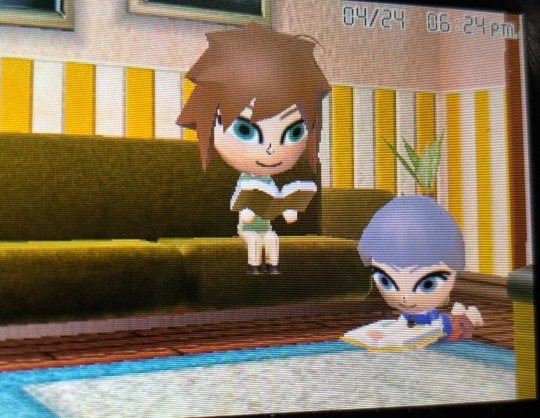
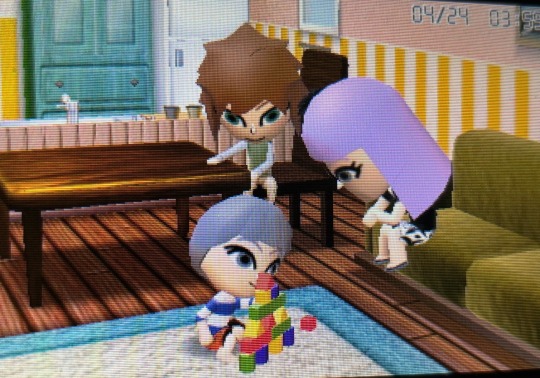
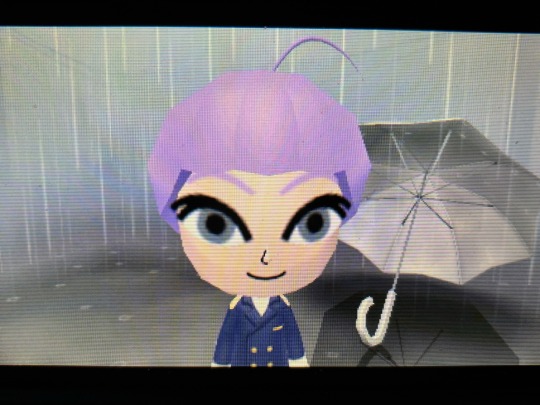
There he is all grown up :3 In a rainy apartment haha~
Also: Makoto and Kyoko already had another child before. So Yuma has an older sister named Hope (of course lol) Its nice that he hangs out with her and the siblings of this game are already in relationships by default~
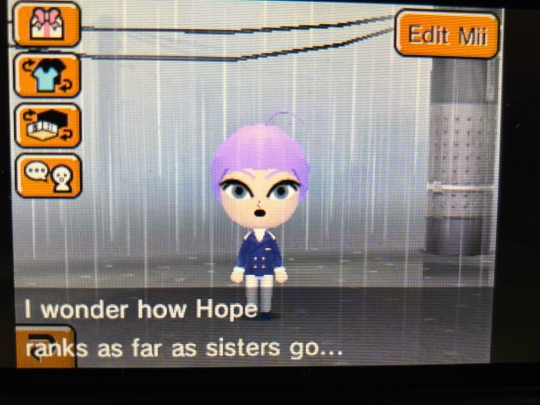
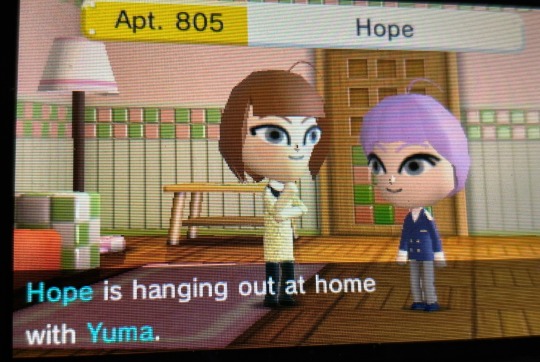
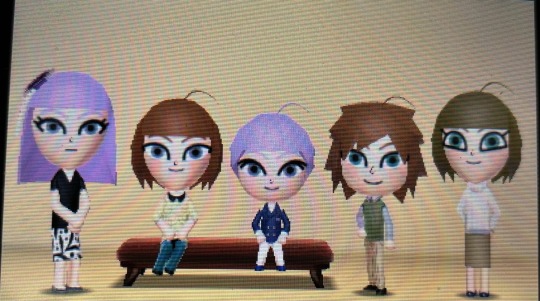
(Hi Komaru LOL)
I actually made a bonus drawing where I included Hope. (or my interpretation of her) Since her eyes are gray, that means her eyes are purple in the art. She has Kyoko's eyes. And since Yuma is as pale as Kyoko, I figured maybe Hope had some of the tanner pigment in her skin like her dad c: (she's more a mix of both her parents, while Yuma is just 90% Kyoko XD)
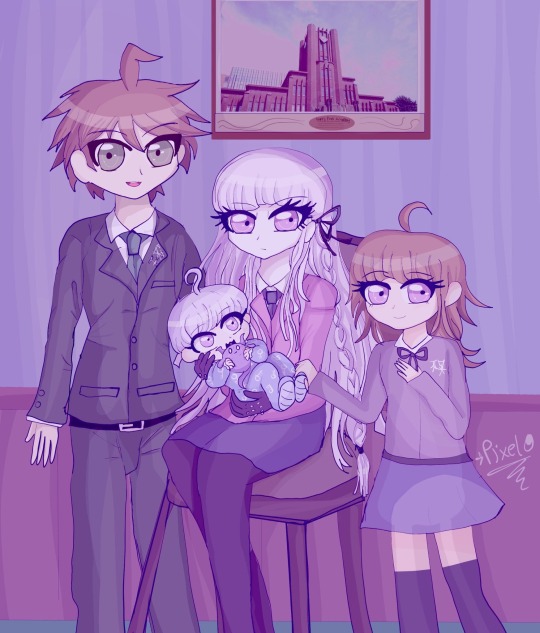
Such a nice family c:
I'm excited for the sequel of Tomodachi LIfe.
And yes, I made everyone else in RainCode once Yuma grew up :3
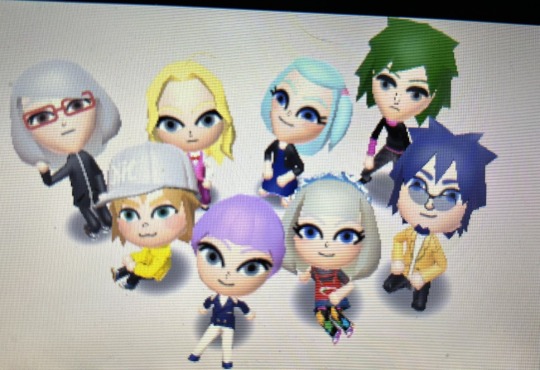
This was the best I could do ;w; The OG mii creator is so limited...
Hope you enjoyed this silly long post x3
#rain code#danganronpa#naegiri#makoto x kyoko#master detective archives: rain code#tomodachi life#makoto naegi#kyoko kirigiri#yuma kokohead#my art#pixeldoodles#lucky detective family#school has been so mentally draining for me…#sorry to be away everyone#but I finally found motivation to draw#and after days of playing this in my downtime…#I finally pushed myself to draw this xD#and it came out pretty good to me~#makoto is wearing his future foundation uniform lol#and baby yuma has a key pattern onesie + a shinigami toy :3#also yes that is a photo of hopes peak I was not gonna try drawing that lol nope#kaito and chisa are shown in the photos too xD#Dangan island is a peaceful island where everyone is alive with no despair :3#raincode being dr’s successor in more ways than one :3
87 notes
·
View notes
Text
THIS. IS PEAK DESIGN

#SHE LOOKS SO GOOD#evergreen elita I WILL LAY DOWN MY LIFE FOR YOU!!!!!#her owl like ears. ugh she's so athena coded#UFHDJDKSKEJDOSKDOWP#PLEASE SHE'S PERFECTION#one of if not her best design ever#and i say that as someone who's fav is earthspark like es ily im sorry but eg beats you#OH i can't wait for her dumbass toy to come out#🩷🩷🩷🩷🩷🩷 SHE'S LITERALLY AMAZING#(e)lita-rally amazing#elita 1#transformers#elita one#elita-1#transformers elita 1#transformers elita one#Evergreen elita 1
103 notes
·
View notes
Text









I had WAY too many Happy Meals when I was in Chile and Argentina... 😅 (because the Chaos Theory toys aren't offered in the United States's McDonald's for some reason???)
#jurassic world chaos theory#mcdonalds#bumpy the ankylosaurus#There's an interactive AR dinosaur thing if you scan the QR code#There's only one McDonalds in Argentina that had the happy meal box with the characters on them...I brought the box all the way back 🤣#The character order is so funny. Every popular ship is not allowed#Also Brooklynn is NOT on there 😂😭#A bunch of McDonalds in Chile and Argentina saw a grown Asian woman freaking out over happy meal toys 😂#my photos
105 notes
·
View notes